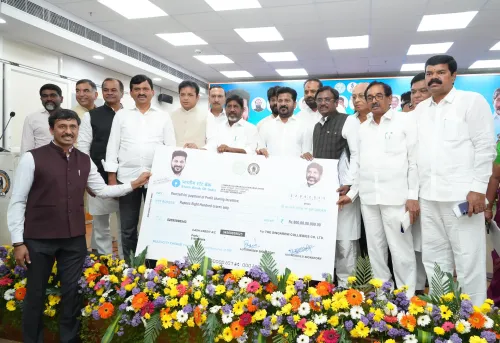How Does GST 2.0 Provide a Boost to the Coal Sector?

Synopsis
Key Takeaways
- GST 2.0 reforms eliminate the Rs 400 compensation cess.
- The GST rate on coal rises from 5% to 18%.
- Coal pricing sees significant reductions for various grades.
- Enhanced liquidity for coal producers is expected.
- The reforms support Aatmanirbhar Bharat initiatives.
New Delhi, Sep 22 (NationPress) The GST 2.0 reforms have led to transformative changes in the taxation framework of the coal industry, promising advantages for both producers and consumers of this fossil fuel, as stated by the Ministry of Coal on Monday.
These reforms have removed the Rs 400 per tonne compensation cess that was previously imposed on coal, while simultaneously increasing the GST rate on coal from 5 percent to 18 percent. Notably, despite the hike in GST rates, the overall tax burden for final consumers is reduced, correcting the inverted duty structure which enhances liquidity, eliminates distortions, and prevents significant accounting losses for coal producers, according to the statement.
The new reform's impact on coal pricing and the power sector is substantial, showcasing a considerable decrease in the overall tax burden, with coal grades ranging from G6 to G17 witnessing reductions from Rs 13.40 per tonne to Rs 329.61 per tonne. For the power sector, the average decrease is approximately Rs 260 per tonne, equating to a reduction of 17–18 paise per kWh in generation costs, as highlighted in the statement.
Furthermore, the rationalization of the tax burden across different coal grades ensures fair treatment, replacing the previous flat rate of Rs 400 per tonne Compensation Cess, which unduly impacted low-quality and low-priced coal. For example, the tax incidence for G-11 non-coking coal, which is produced in the highest quantities by Coal India Limited, was 65.85 percent, compared to 35.64 percent for G2 coal. With the cess now removed, the tax incidence across all categories has been aligned to a uniform 39.81 percent, the statement notes.
This reform significantly supports Aatmanirbhar Bharat and reduces import reliance by eliminating the cess, which previously distorted the competitive landscape. The prior flat GST Compensation Cess of Rs 400 per tonne resulted in the landing cost of high gross calorific value imported coal being lower than that of Indian low-grade coal. This adjustment strengthens India’s self-reliance while curbing unnecessary coal imports.
Additionally, the reforms have addressed the Inverted Duty Anomaly by raising the GST rate on coal to 18 percent. Previously, coal attracted 5 percent GST while the input services utilized by coal companies were subject to higher GST rates, typically at 18 percent. This discrepancy caused a significant accumulation of unutilized tax credits for coal companies due to their lower output GST liabilities.
Without provisions for refunds, this amount kept escalating, blocking much-needed funds. Now, this unutilized amount can be utilized over the coming years to settle GST tax liabilities, leading to the release of blocked liquidity and enabling coal companies to mitigate losses due to the accumulation of unutilized GST credits, thereby enhancing their financial stability.









